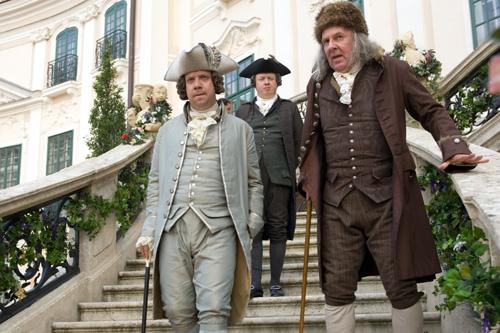New HBO miniseries reveals another side of John Adams

This photo from HBO shows actors portraying founding fathers in a scene from the HBO miniseries “John Adams.” Kent Eanes, The Associated Press
March 13, 2008
LOS ANGELES – Playing America’s second president in HBO’s “John Adams” was quite the hands-on experience for Paul Giamatti.
On a break from his governmental duties at his Massachusetts farm, Adams shows his son, John Quincy, the finer points of working with manure – manually. “He was obsessed with coming up with a better kind of manure,” the actor explains. “And that was real manure … of some kind.”
As unpleasant as it might have been for the actor, Giamatti insisted the producers keep the scene intact. “It was eccentric,” he says, “but Adams took great pride in the fact that he was a real farmer, and it was emblematic of his being a real person.”
The seven-part miniseries premiering 8 p.m. EDT Sunday is, in fact, loaded with realistic portrayals of both the people and the period which, its creators feel, will depict the American Revolution in a way not previously available to audiences.
“I think it’s as close as anything has ever been to bringing those people and that time alive in a fashion that I don’t think people will ever forget,” says historian David McCullough, on whose book about Adams the series is based.
Get The Daily Illini in your inbox!
“Anything else would have been a waste of time,” adds executive producer Tom Hanks.
Everything from the Boston Massacre and the vote for independence to the Adams family’s primitive farm life, smallpox outbreaks and barbarous practices like tar and feathering are portrayed with gritty accuracy.
“It was very important to all of us that it be a sensory experience,” explains Laura Linney, who plays Abigail Adams. “It was not an elegant time.”
Adds director Tom Hooper: “Anyone who thinks it was a ‘golden age’ need only look at the smallpox sequence to be reminded what a tough age it was.” In that scene, a doctor attempts inoculation of one of Adams’ children by transplanting tissue from a writhing, boil-infested victim he totes from house to house in a cart.
In another scene, a mob pours a large kettle of boiling hot tar on a British sympathizer. “You can’t watch that scene and ever think of tar and feathering again as some sort of high school prank,” McCullough notes. “That was torture. People died from it.”
Perhaps most important, though, is the portrayal of America’s founding fathers as more than the one-dimensional, schoolbook images.
“We tend to think of them as godlike characters – marble deities or folk figures,” explains McCullough.
“We have stereotypes about what the Declaration of Independence was and who these men were,” Linney adds. “We know they were great men – but why were they great men?”
The most intriguing, of course, is Adams himself, who, says HBO Films President Colin Callender, was nothing short of the complicated figure Giamatti portrays.
Adams was a “rational man,” he notes, “and yet a man who’s impetuously impulsive and often acts without thinking. He’s humble, yet madly ambitious. He was a simple man, who was very vain. He was a man who loved his family, yet spent half his life away from them. And Paul is fearless in portraying all of this, warts and all.”
As if those weren’t enough personal issues for one founding father, Giamatti adds that Adams was “neurotic and he was depressive. And he was a hypochondriac. He would have complete collapses, and it was never entirely clear what was wrong with him.”
Balancing out Adams’ shortfalls were the strengths of his wife, Abigail, who suffered those long gaps away from her husband – as long as five years – forcing her to run the farm and family alone.
Despite such separation, however, the two maintained a durable and relatively close relationship, as evidenced by their letters to each other.
In one scene in the film, when asked by Abigail if Washington would mind delivering her letters to her husband, Washington respectfully answers, “The sooner he receives these, the sooner we’ll be beneficiaries of your wisdom.”






